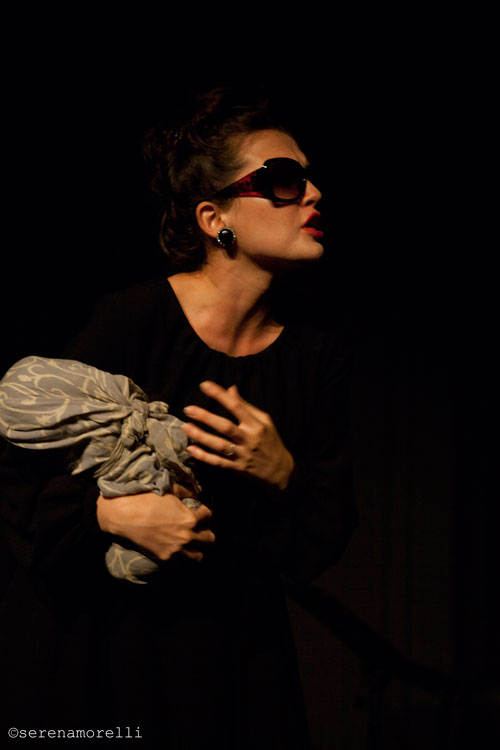StormStressLenz
A PLAY by Martin Schwartz
A NOTE FROM THE AUTHOR: Last spring I was in Phoenix with a production of a very dark show of mine, one I had written inspired by an 18th century Sturm und Drang (“storm and stress”) tragicomedy. Lips chapped, broke, I found myself in a ramshackle hostel in the desert, with five of my dearest friends and a big, creepy epoxy puppet. I was happy, tired, wired, on the fringe of civilization and the rim of hysteria. I had exhausted myself. The show played relatively well.
After I flew home to San Francisco, I spent more than a year writing my next play and not directing anything at all. I needed strong medicine. And so what should I pick up to read but the very thing that precipitated the whole mess: The Tutor; or, the Benefits of Private Education (1774), by Jakob Michael Reinhold Lenz, whose undisciplined spirit is surely languishing still in some East Prussian purgatory. The play shocked me then as it had shocked me when I was twenty. In it, an impecunious student with a wolfskin coat curses and stamps his feet at his landlady when she doesn’t bring his coffee and throws the service out the window when she does. A fool applying for a position as a domestic boasts he’s had at least fifteen dancing masters and never missed a ball. A girl delivers a piteous monologue to the ghost of her father, hurls herself into a pond to drown, and is dragged out, unconscious, by that same father. And, most marvelously strange, an incontinent tutor castrates himself, is vigorously congratulated by the phlegmatic local schoolmaster, and, romantically equipped or no, proceeds to marry a pretty shepherdess.
I went on to read through the rest of Lenz’s four major plays: The Tutor, The New Menoza, The Soldiers, and The Englishman. They are awesome crags, on which pickaxe words like “good” and “bad” can gain no purchase. I saw repetitions, patterns, an involuted personal system of the drama—drama, action—that for all its extravagantly evident artifice felt sincere, universal, and pure. In my reading, the four plays became one. Across the plays, I began to mark and to translate the passages that most piquantly expressed the themes, actions, and conventions that reminded me I was reading Lenz. I started thinking of how to shape a show out of this material. These bits took level aim at serious emotional content, grounded just enough in form to stay on the ground. What other art communicates this way? I asked myself. Thrashing. Direct. But of course, I said: music. Rock & roll. Brahms.
From there it was only a step to conceive of a show in which a quartet of actors would perform as a chamber ensemble. The acting would be direct and presentational, the bits separated from each other (and from non-acting) by the clear bite of a bell, controlled by a conductor. The units of language and action, freed from a narrative coherence they never wore well, would be of the strong medicine of J. M. R. Lenz.
Performed by Margery Fairchild, Ryan Hayes, Meg Hurtado, and Nathan Tucker, with the author conducting, StormStressLenz premiered at the 2013 San Francisco Fringe Festival, where it was awarded Best of Fringe. The text will appear in The Lenz Variations, forthcoming from Exit Press.
//
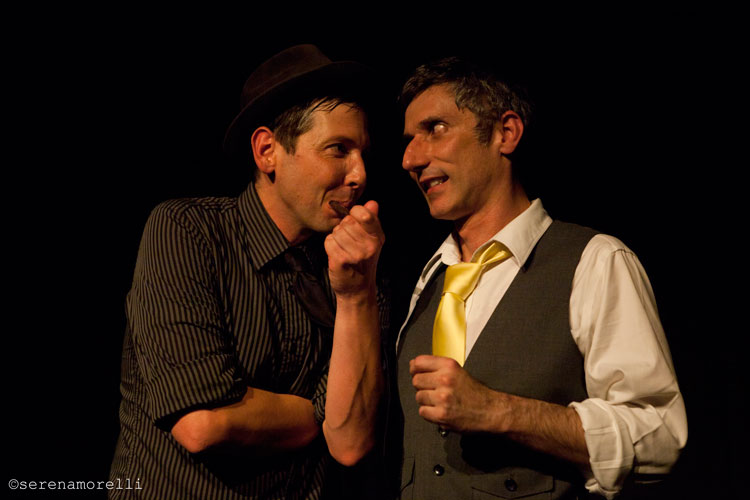
Burgomaster (Ryan Hayes, L) and his son Zierau (Nathan Tucker, R) share a lesson in classical dramaturgy.
StormStressLenz
Interlude 1. Music: MC5, “Kick Out The Jams”
BURGOMASTER: Hey! Come with me. The weather’s so foul I need some entertainment.
ZIERAU (playing the violin): But where would you have us go, Papa? I am already half undressed.
BURGOMASTER: Put your fiddle away! To the puppet show. The life of a Burgomaster is wretched. I’ve worked my fingers to the bone signing decrees at town hall, and now I need to have a laugh.
ZIERAU: O pfui, Papa! Night after night at the puppet show. You are prostituting yourself! Pleasure without discernment and taste is no pleasure at all.
Section 1: Introductions
MAJOR’S WIFE: Why, what’s the matter with your stomach, Count? Was it the oysters?
COUNT: Oh, no, I’m used to them. The other day my brother and I ate six hundred of the things in a sitting, and had twenty bottles of Champagne with them.
MAJOR’S WIFE: You mean twenty bottles of Rhenish.
COUNT: Champagne–it was an idea I’d had, and it agreed with us both splendidly. That very night we went to a ball in Koenigsberg, my brother danced till the next afternoon and I lost a heap of money at cards.
MAJOR’S WIFE: Shall we have a hand?
COUNT: If Miss Gussie came down I should like to take a turn or two around the garden with her. I wouldn’t presume to ask you, my lady, what with the abscess on your foot.
//
(BIEDERLING, LADY BIEDERLING, and PRINCE)
BIEDERLING: Here, wife, I bring you a guest. We stayed in the same house in Dresden, and as he had planned to travel to France by way of our town, I invited him to come by our home and have a look at the gardens.
LADY BIEDERLING: It is an honor—
BIEDERLING: This is no everyday traveler, wife! He is a prince from another world, come to examine our Europe and see if it’s worthy of its reputation. And so we must do our best to give him a good opinion of us. Just think, to be known as far away as Cumba, a land that isn’t even on our maps.
//
(ROBERT fires his weapon, the window opens, the PRINCESS looks out.)
ROBERT: (kneels) Is it you, divine Armida? –O do not hate me for this rash gesture! Look upon an unhappy man who is determined to die, and knew no other means by which to see you once more before his death, to tell you that he dies for you.
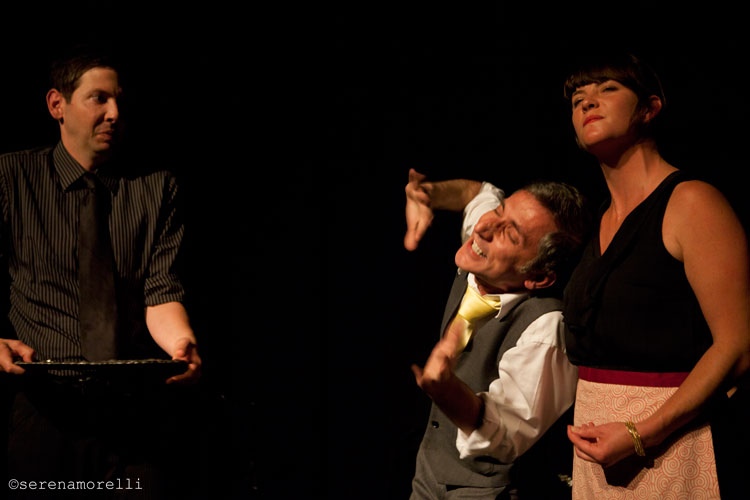
Landlady Mrs. Blitzer (Margery Fairchild, R) grabs a hold of rambunctious tenant Pätus (Nathan Tucker, center) as his university comrade Fritz (Ryan Hayes, L) looks helplessly on.
//
PÄTUS: But a pox on it, where’s my coffee? (Stamps his foot.) Mrs. Blitzer!—Now you’ll see how I treat these people—Mrs. Blitzer! For the love of God, Mrs. Blitzer. (Rings and stamps.)—I paid recently so I can do as I please—Mrs.—
(MRS. BLITZER enters with a pot of coffee)
PÄTUS: Good lord, you old shrew! Where have you been? I’ve been waiting for over an hour—
MRS. BLITZER: What? You craven mongrel! Shut your gaping yap, you. You making trouble again, you lice-ridden cur? I’ll be bringing my coffee back downstairs this instant—
PÄTUS: (Pours himself a cup.) Now, now, not so testy, old woman! But biscuits! Where are my biscuits!
MRS. BLITZER: The last thing you need are biscuits! There aren’t any biscuits. What difference does it make if a lazy, mangy cur like you gets his biscuits every afternoon or not.
PÄTUS: God curse this hateful crone! (Stamps his foot) She knows I won’t let a drop of coffee pass my lips without my biscuits—What do I spend my money for—
MRS. BLITZER: (handing him biscuits from her apron while grabbing his hair) There, you see your biscuits now, you bleating ass? He’s got a voice like an entire regiment, this one. Well now, is the coffee to your taste? Is it? Tell me now, or I’ll rip every last hair off your head.
PÄTUS: (drinks) Incomparable—Aiii!—I’ve never had better in my life!
MRS. BLITZER: Listen up, you rabid yellow dog! If you didn’t have this old lady to look after you and give you food and drink you’d starve on the street like the dog you are.
//
MAJOR’S WIFE: You’re cognizant that in the world today, nothing counts so much as bearing.
LÄUFFER: I hope your Ladyship will be content with me. At any rate, I never missed a ball in Leipzig, and have had at least fifteen dancing masters.
MAJOR’S WIFE: Oh? Then let us have a display. (LÄUFFER stands.) Not so timid, Mr. Läuffer! A bit of boldness, now. My son is quite shy enough; if he were to have a clumsy tutor, he’d be positively ruined. Do me the favor of joining me in a Menuet, just as a demonstration, so I can judge.–Well, well, that will do; my son has no need of a dancing master at present. And a Pas as well, if you please. Perfectly acceptable. It will be quite all right once you’ve attended one of our soirees. Are you musical?
LÄUFFER: I play the violin, and in dire emergencies the piano as well.
MAJOR’S WIFE: So much the better: when we stay in the country and young ladies come to visit us I’ve always had to sing something myself when the children felt like dancing. But better is simply better.
LÄUFFER: You sing? Your Ladyship puts me at a disadvantage! Where in the world is there a virtuoso who could hope to match the beauty of your ladyship’s voice with his instrument?
//
(MARY, a cavalry officer, enters.)
MARIE (her face quickly brightening. With the utmost cheerfulness and friendliness): Your humble servant, Monsieur de Mary! Have you slept well?
MARY: Incomparably, my gracious lady! In a dream I relived all of the fireworks display we saw yesterday.
MARIE: It was indeed beautiful.
MARY: It must have been beautiful, because it has your approbation.
Section 2: Love
COUNT: O my gracious (kisses her hand) lady! Your daughter is your living image; if you grant me your approval, her consent is sure to follow. Oh, to kiss your beautiful cheeks, shining with the glory of the midday sun, (kisses her) affords me the same ecstasy as a kiss upon the budding dawn of Wilhelmine’s—
LADY BIEDERLING: You are gallant enough, my dear Count, not to expect a response in kind. Our society in Naumburg is hardly attuned to such high chivalry.
COUNT: But, my gracious lady! What answer do you tender me? Shall I live or die, despair or hope? All, all depends–
LADY: Seek your answer from my daughter, from my husband…
COUNT: You are your daughter, you are your husband. I have property, gracious lady, but it is but a burden to me unless I may share it with the being whose presence grants me life. For until now, I have not lived; until this hour, I have been a mere automaton. (kneels) O behold me at your feet, behold me beseeching, imploring, distressing, weeping, despairing.
LADY: You flatter me too much—but consider what it is that you demand! An elopement, a marriage in secret, without witnesses, without a proclamation—
COUNT: (kisses her knee) You must not waver in the trust you place in me. (Kisses her knee again) My gracious, angelic lady! If you mistrust me, I am the unhappiest creature under the sun, a beast whose malady knows no remedy save the first best bullet through the brain. I should have to be the blackest villain, the most abject, miserable deceiver—
LADY: O my dear count!
COUNT: O if you could but see my heart (kisses her hand and mouth) o my angelic mother! Have pity on me! If you could but see my heart! Wilhelmine—or I shall go mad!
//
STOLZIUS: Mother, if a little bird took one pebble a year off of a mountain, in the end he’d take the whole mountain down.
MOTHER: I think you’re hallucinating. (Takes his pulse) Lie down, Karl, I’m asking you for the love of god. I’ll cover you up warm—good god, what a fever, and all for the sake of a common slut.
STOLZIUS: In the end, in the end—one pebble every day, a year has twenty thirty hundred. (MOTHER tries to lead him away.) Leave me, mother, I’m well.
MOTHER: Come on, come, (drags him off by force) fool!—I won’t let you go, you believe me that.
//
Interlude 2. Music: Brahms, Sonata No. 1 Op. 78 Vivace ma non troppo.
BURGOMASTER: What are you always on about with your taste. Are you a fool? Boy! Why should the puppet theatre taste like anything?
ZIERAU: That which does not imitate the beauty of nature, Papa, can give no enjoyment.
BURGOMASTER: But that’s foolery. I do enjoy the puppet show, boy! Are things not good enough for you as they are, you little twerp, you? Tarnation and thunderbolts, it hurts my ears something awful to hear the brat go on so with his reasoning.
ZIERAU: But what pleasure could you derive from a performance in which there is not the slightest illusion (French pronunciation), the slightest trompe l’oeil?
BURGOMASTER: Illusion? What kind of a blasted thing is that? Is it expensive?
ZIERAU: Ay, Papa! Must you look at everything as a tradesman? Illusion is illusion. Now, there are certain rules for illusion—which is to say, for sensory deception, wherein I truly think I see what is merely being performed before me.
BURGOMASTER: So? And what are these rules? Though it is true, what you say, I do always have the feeling they’re just performing at the puppet theatre.
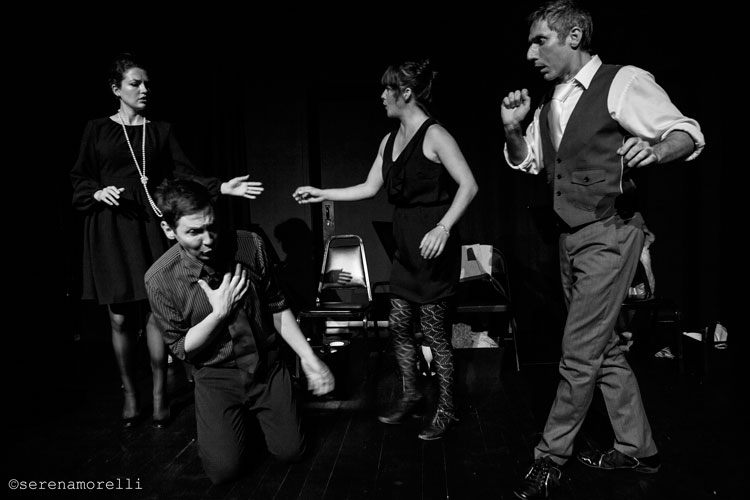
Paterfamilias Biederling (Ryan Hayes, kneeling) feigns a fainting spell, distressing his wife (Meg Hurtado, L), daughter (Margery Fairchild), and houseguest (Nathan Tucker).
//
BIEDERLING: By all the sacraments no! (Stamps his foot.) If I am only on this earth to hinder your happiness—well out with the old wood, eh, Prince? What do you say to that?
PRINCE: You are cruel to force me to speak. Such pain knows no balm but silence. (With weak voice.) Silence, to speak no more, forever. (Tries to leave.)
WILHELMINE: (abruptly holds him back.) I love you.
PRINCE: You love me.
(Falls unconscious to her feet.)
WILHELMINE: (Falls to him) O I feel it, I cannot live without him.
BIEDERLING: Hullo! Give him one on the mouth so he wakes up.
PRINCE: (Opening his eyes) O, from such a hand…
BIEDERLING: Yes indeed, it is so. Yes, Minnie! That look you gave him. He has your consent, doesn’t he? Well, then almighty god bless you and keep you. (Lays his hands on his forehead.) Prince! I feel as you did, the devil has taken my speech and it won’t be long until a cursed fainting spell comes upon me…(With a weak voice.) Wife, will you wake me?
(He falls.)
LADY BIEDERLING: God, what is this?
(Goes to him.)
BIEDERLING: (Jumps up.) Nothing! Just wanted to make a joke. Ha ha ha, you women will believe anything. Now be merry, my little wife (grasps her by the chin) and get your count out of your mind, I’ll send him out of the house, I never could bear him.
(She exits)
BIEDERLING: (Watches her exit.) The fool! She’s in love with the Count, that’s all there is to it. But let me just have a word with him…just you wait.
//
WENZESLAUS: Tell me, what is it?—You look as though you’d killed a man—why do you screw your face up so—God’s blood, I must to Schoepsen the surgeon—
LÄUFFER: Stay—I don’t know if I’ve done rightly—I castrated myself.
WENZESLAUS: Wha—cast—then accept my hearty congratulations! Outstanding, young man, you second Origen! Let me embrace you, you precious, elect armamentarium!
Section 3: Tricks
ROBERT: Quiet now, Robert, here they come. (Throws himself back into the armchair and appears to sleep.)
(LORD HOT and LORD HAMILTON come. They’ve seen this, and smile at one another.)
LORD HOT: There is some chance of improvement with him, Lord Hamilton.
LORD HAMILTON: If only there were a way to teach him a sense for voluptuousness and comfort; he has never tasted those pleasures, and if this storm in his soul rages on, he never will.
LORD HOT: If only I had him in England!
LORD HAMILTON: Here! Here! Italian eyes have great eloquence, especially for a British heart.
ROBERT: (between his teeth) The traitor!
LORD HOT: It grieves me that I did not arrange a woman for him before he left home.
LORD HAMILTON: Do not trouble yourself: I know one here that could seduce Saint Anthony of Padua. Eyes so languorous and youthful as Venus’s when first she emerged from the sea and drew down the gods from heaven. She is such a masterwork of nature that all the brushes of our greatest painters despair at the sight of her. Her arms, her breasts, her shape, her posture—oh, when she leans, invitingly, back, and a thousand tender movements begin to stir the snow of her busom—
ROBERT: (throws his watch at his head.) You animal!
LORD HOT: (runs to him, quite angry, as though he’d like to strike him) Animal yourself! You should be thrown into the deepest stinking pit under the earth!
//
PÄTUS: You see, the service is quite good here. I pay plenty, it’s true, but in return I’m really taken care of.
FRITZ: (drinks) The coffee tastes like barley.
PÄTUS: What? (tastes) Why, you’re right! With the biscuits I never really—(looks into the pot) Well! I’ll throw the coffee service out the window! (Throws the coffee things out the window.) Take that! Five hundred guilders a year and barley coffee!—
MRS. BLITZER: (barges in) What? What in the devil’s own name, what is this? Master, has he gone mad, or is he possessed by Satan?—
PÄTUS: Be still, old woman.
MRS. BLITZER: (with a horrific scream): But where is my coffee service? Oh! The devil take you! No! Out the window?—I’ll scratch the eyes out of your head.
PÄTUS: There was a spider in it and I tossed it in a fright.—It’s not my fault the window was open!
MRS. BLITZER: A spider? If only it had had killed you dead! You bring us nothing but loss and sorrow. I’ll have you prosecuted. I’ll have you thrown in the pit. (Runs out).
PÄTUS: (Laughing) What’s to be done, brother? You’ve got to let her wear herself out.
//
PÄTUS: (Sits opposite a wolfskin coat that hangs on the wall.) Hm! From all my clothing nothing saved except this wolfskin coat. And it’s precisely the one I can’t wear in summer, and the one not even the Jew will take off me, just because the worms have started in on it a little. …The devil take you, Hanke, you give credit to every Tom, Dick, and are only cheap with me, of all people! (Grabs his own head and stamps his foot.) Me, of all people! Me of all people!–
BOLLWERK: (who has slithered in unnoticed, grabs onto Pätus, who turns and stands mute before him.) Ha ha ha…Oh, my poor Pätus–ha ha ha! Oh, what a godless wretch that Hanke is, to make clothing for everyone on credit except for you, of all people–but wait, where is that red suit with gold that you ordered from him, and the red satin one with the black satin lining, that would be perfect this time of year. That damned Hanke! What’s taking him so long with your orders?
PÄTUS: (throwing himself into a chair) Leave me in peace.
//
ROBERT: (Lifts the locket from his chest). Look, here is a locket around my neck; the portrait within is the only obstacle for your charms. If you wish to become the mistress of my heart, give me a scissors that I may remove the image from my neck, to which I bound it, alas for all time! I cannot bring myself to look into your magical eyes, to press your soft hand to my heart, to approach your glowing lips with my shaking mouth, so long as this portrait weighs upon my chest.
TOGNINA: Right away, my lord! Here are the scissors. (Takes a scissors from her bag and seats herself on the bed to cut the necklace off.)
ROBERT: (tears the scissors from her hand and stabs himself in the throat.) You slut! At last I’ve outwitted you.
//
OFFICER: Just last night I was leaning against a house to read a letter in the shadows, and Rammler saw me. The dog immediately thought it was a love letter that had been thrown down to me from a window above, and so he creeped around the house until midnight waiting for a sign. But listen to this: an old Jew of sixty years owns the place, and he sent down guards to the street to watch me and to give a sign if I tried to break in. I bought the secret from one of the boys for three pounds; I thought I’d go crazy with laughter.
ALL: Ha, ha, ha, and Rammler thought it was a pretty girl inside, but it was a Jew.
MARY: Listen, comrades, if you want to have a real laugh let us tell the Jew that someone’s out to get his money.
HAUDY: Right, right, lord of mercy, let’s go straight to him. Then we will have a comedy that’s never seen its like. And you, Mary, convince him that the most beautiful woman in Armentières lives there, and that Mary has promised that he will go to her tonight.
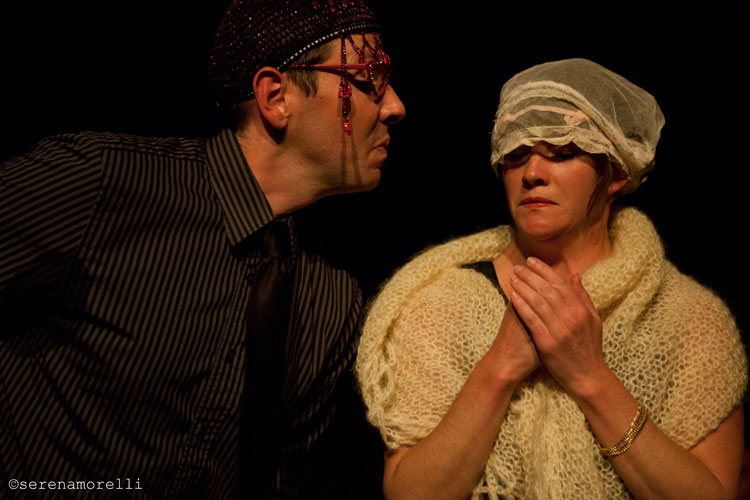
The aristocratic Donna (Ryan Hayes, L) commands her longsuffering maid Babet (Margery Fairchild) to read a document with explosive content.
//
BABET: I’ve seen you in gentler temper.
DONNA: We’ll leave gentleness to the men, the men that lick our hands and then strangle us in our sleep. A woman must not be gentle, or else she’s a whore, and may as well have her hide spanned over a drum. Read, witch! Or I’ll skin your hide—the only possession you’ve got left—and sell it to a drummer boy.
BABET: (reads) “If your heart, you abject soul, is still capable of horror, for all other emotions have deserved it—your father died of poison. If your spouse is still with you, tell him I will as is just demand my jewelry back from him, which you both stole from me. But you—I want to tear the veil from you, and show you who you are. Not my daughter: I could never bear a parricide. You were…switched.”
DONNA: No further, read no further—merciful god and all the saints! Let me catch my breath. (Throws herself upon a chair. BABET tries to creep away, DONNA springs up and drags her to the ground.) You damned gremlin! Will you read?
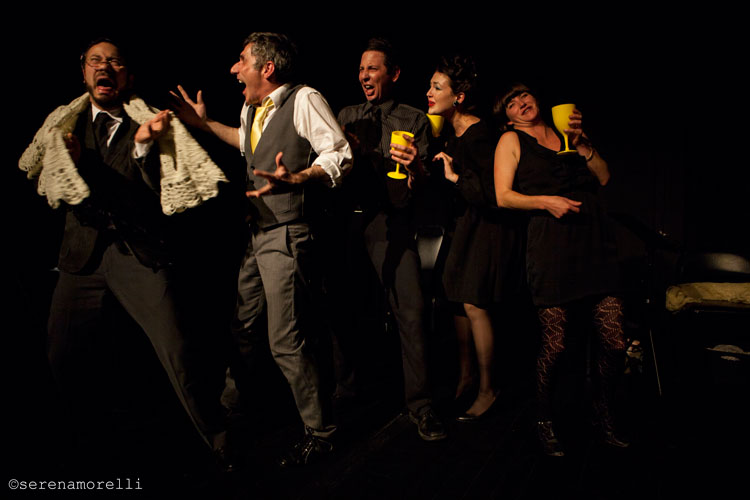
The Rape of the Jew. Aaron (Martin Schwartz, L) recoils at the touch of Rammler (Nathan Tucker, second from L), as Rammler’s misled attempt at debauchery is uncovered by his fellow officers (L-R Ryan Hayes, Meg Hurtado, Margery Fairchild).
//
(The Jew’s room. Dark. Mary and Aaron whisper into each other’s ears. Rammler creeps closer, always taking a step back when he hears a movement or noise.)
MARY: He’s here inside.
AARON: Oy vey is mir!
MARY: Be quiet. He won’t harm you, let him do with you what he will; even if he gags you, I shall be right back with the guards; he’ll have it badly enough. Lie down.
AARON: And vat if he should take my life, eh?
MARY: Don’t trouble yourself, I shall be back in the blink of an eye. Otherwise we can’t catch him in the act. The guard stands at the ready. I’ll just call them in. Lie down!
(He leaves. The Jew lies down. RAMMLER creeps ever closer.)
AARON: (His teeth chattering.) Adonai! Adonai!
RAMMLER: (to himself) I think it may be a Jewess. (Aloud, imitating Mary’s voice.) Ach, my sweet, how cold it is outside.)
AARON (ever quieter): Adonai!
RAMMLER: But you know me, my dear. I’m not your husband—I am your lover Mary.(Removes his boots and coat.) I think we’ll even get some snow, it’s so cold.
(MARY enters with a large group of officers with lanterns, and begin an outrageous laughter. The JEW sits up in shock.)
MARY: Have you gone mad, Rammler? Did you want to fornicate with the Jew?
(RAMMLER stands as though turned to stone. Finally, he pulls his dagger.)
RAMMLER: I’ll cut you all into a million pieces, all of you.
(Runs off, very confused. The others laugh uproariously.)
AARON: Gott knows I vas half dead vit fear.
//
A HUNCHBACK: (toasting) Gentlemen, to the man who’s bought our wine: the Prince’s health!
A LAME MAN: A fine gentleman, God save him!
A BLIND MAN: If god only had the mercy to let me see him with my own eyes.
ANOTHER BLIND MAN: I don’t want to see him: they say he always looks so sorrowful, and that would break my heart.
LAME MAN: They say he lost a beautiful woman. Yes, Death always takes a fine prize for himself; lame dogs like us he leaves on earth. (Pours himself wine). Our health, folks, let’s drink to Our health. (They clink glasses.)
BLIND MAN: Where are you, my friends? I want to clink mugs, too!
LAME MAN: Not you, or else you’ll soak our trousers with your wine!
Section 4: Conflict
WILHELMINE: Well, well, what a fine opinion you have of yourself! And yet you’d hang yourself if I ever…
PRINCE: O pooh! Pooh! No more of this. I’d rather simply confess that I’m in love with you.
WILHELMINE: You little fool, the shiny, little tear on your cheek confessed it long ago.
PRINCE: Then let it be said.
WILHELMINE: (pressing her hand to his eyes) And let it be answered. (Kisses him.)
(Enter MASTER VON ZOPF. All rise.)
MASTER VON ZOPF: (in travelling clothes) Your humble servant, Miss Minnie! Ay, how big you’ve gotten since last I saw you. You won’t remember me: my name is Zopf.
WILHELMINE: (gives him a low curtsey.) A pleasure to meet you—my parents have often spoken—
MASTER VON ZOPF: Your father not at home? Your parents won’t have been very pleased with me, but now they’ve got no more cause for anger. I bring you wonderful news. (To TANDI) Would you happen to be Prince Tandi of Cumba? I’d heard in Dresden that you’d travelled here with Biederling. It couldn’t be more opportune—celebrate with us all: Prince, you are in your father’s house.
PRINCE: What?
WILHELMINE: What?
MASTER VON ZOPF: Embrace each other: you are brother and sister.
Interlude 3. Music: Brahms, Piano Concerto 1, Op. 15. Rondo.
ZIERAU: Certain rules have been laid down, without which this illusion, this sensory deception cannot take place—chief among these rules are the oh-so-controversial three unities; which is to say, if the entire plot does not take place within twenty four hours in a single location, then I cannot possibly follow it and my entire enjoyment of the piece is ruined.
BURGOMASTER: Wait! Hm. I shall examine this tonight, my boy, I understand—I’m beginning to understand—three unities, that’s the same as three times one, and the whole thing’s only supposed to take two times twenty four hours? What, but wait now, no day ever took so long.
ZIERAU: Yes, Father! That’s another thing entirely. I must imagine that the whole thing only lasted twenty four hours.
BURGOMASTER: Well and good, well and good. I’ll imagine it tonight, then. Do you want to come? I’ll examine the thing, and if the players don’t do it right I’ll make them answer to me, then I’ll send the rascals packing right out of town.
//
GUSSIE: Just let me go, old woman: I’m as strong as a young bear—and look after the child.
MARTHE: How should I look after it, by the blessed virgin! when I’m completely blind? When it wants to nurse should I take it up to my black, dried-up teats? And you’ve no strength to take it with you. Stay at home, Grethel dearie, stay at home.
GUSSIE: I mustn’t, old woman, my conscience drives me forth. I have a father who loves me more than life itself and his very soul. Two nights ago, I saw him in a dream: he was ripping out his white hair and his eyes were bloody red: he must think me dead. I must go to the village and bid someone to give him news of me.
//
DONNA: Take that, I stab you with my hairpin.
COUNT(Removing a knife from his wound): I am murdered. (He is bandaged.)
DONNA (Her hair wild, attempting to put it in order): The dog tried to strangle me. –Why are you standing around? What are you looking at? What is so shocking? That I put a dog to sleep that tried to kill me?
ZIERAU: For the love of god.
DONNA: What is it, you hussy—Now where is my hairpin?
//
Section 5: Sorrow
GUSSIE (lying by a brush-ringed pond): Then shall I die here?–Father! My father! Do not lay blame on me for having no news of me. I’ve used the last of my strength–for it is exhausted—to find him—His image always floats before my eyes! He is dead, yes, dead–dead of sorrow for me–his spirit came to me last night to give me the news–to call me to account–I’m coming, father, yes, I’m coming. (Gathers herself and throws herself into the pond.)
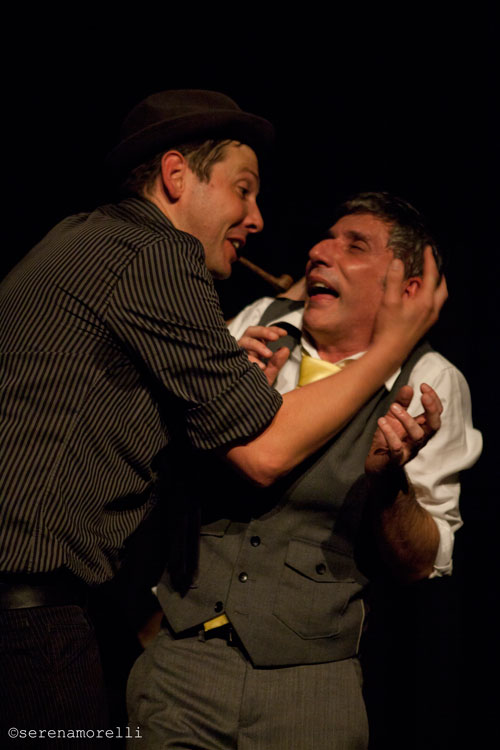
His evening at the puppet show ruined, the Burgomaster (Ryan Hayes, L) remonstrates against his son (Nathan Tucker) and against the three unities.
//
Interlude 4. Music: Rolling Stones, Jumpin’ Jack Flash.
BURGOMASTER: Still lazing about here? Wait, I’ll teach you the three unities and the thirty four hours (hits him). The devil upon your head. Oh, you must be bored with this entertainment. I’ll help you while away the time. (Dances around the room with him.)
ZIERAU: Papa, what’s wrong with you? Papa!
BURGOMASTER: You dog! You want to spoil the amusement of honest folks? You poisoned my entire evening. I’d worked my hands raw signing decrees at town hall, then along comes a lazybones scoundrel and tells me about the three times one and the beauty of nature, and so I sit in the puppet show all night like a fool who doesn’t know why god made him. I counted and calculated and looked at the clock. (Strikes him.) I’ll teach you to lay down rules about how I should amuse muself.
ZIERAU: Papa, what can I do for it?
BURGOMASTER: Of course you can do something for it. Don’t reason any more. Do you hear me? Enough with your reason! Don’t reason!
Section 6: Resolution and Reunion
WILHELMINE: Here!
PRINCE (at her feet): Your longsuffering husband!
WILHELMINE: Is this a dream? (Embraces him.) Do I really have you?
PRINCE: God save me! God save you! O Incest! O Sin! Who can resist you when you take the form of Wilhelmine?
WILHELMINE: I am not your sister.
PRINCE: O more balsam! More balsam! O holy balm!
WILHELMINE (Throwing herself once more into his arms.): I am not your sister.
PRINCE: For this my suffering never dared to hope, never dared to wish! I am awakened from death. Say it again, say it to me a hundred times.
WILHELMINE: I would dissolve into your arms, my husband! My brother no more, my husband! I am entirely joy; I am entirely yours.
PRINCE: Mine forever. My rediscovered life.
WILHELMINE: My rediscovered soul!
//
MAJOR: Hi ho! Someone’s in the pond—This way to Gussie or to hell! (Jumps in after her.)
MAJOR: There!–(Lays GUSSIE down. PC and COUNT attempt to revive her spirits.) You cursed child! Jumping into a pond–is this how I raised you? (Kneels down to her.) Gussie! What do you need? Did you swallow much water? Are you still my little Gussie? You heathen scamp! If you’d said a single word to me beforehand I would have bought the scurvy rascal who impregnated you a noble title and you could have run off together.–God save us! Help, she’s fainted again. (Jumps up, wrings his hands, paces)
GUSSIE (with a weak voice): My father!
MAJOR: What do you need?
GUSSIE: Forgiveness.
MAJOR (goes to her): The devil forgive you, undutiful child.–No, (kneels to her again), anything, just don’t faint again, my Gussie–my Gussie! I forgive you; everything is forgiven and forgotten — God knows I forgive you–you must forgive me!
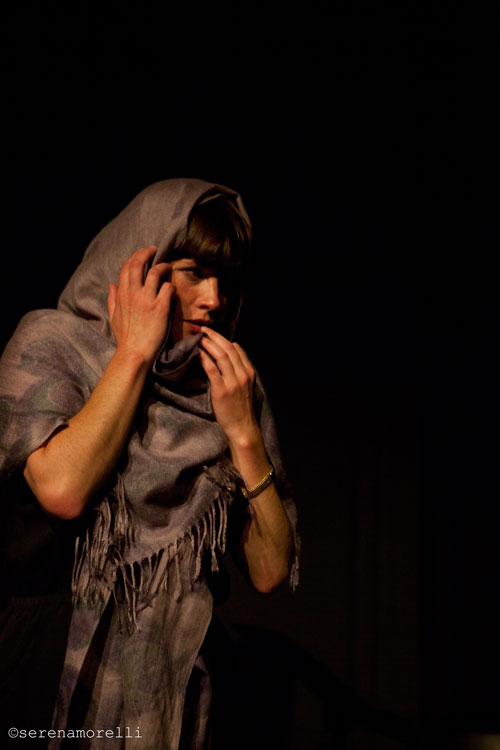
Marie (Margery Fairchild) adjusts her headscarf as she realizes the man she has approached is in fact her father.
//
WOMAN: Please, sir, alms. My father was an honest man.
WESENER: (turning around and rubbing his eyes. To her, quite beside himself) Where are you from?
WOMAN: That I cannot say—but I am the daughter of an honest man.
WESENER: Was your father a haberdasher?
WOMAN is silent.
WESENER: Your father was an honest man? I shall take you into my house.
WESENER: Does not your father live in Lille—
(At this last word, she falls upon his throat.)
WESENER: (Cries loudly) Ach, my daughter!
MARIE: My father! (Both fall, half dead, to the ground. A crowd of people gather around them and carry them off.)
//
(Music cue: Brahms, Deutsches Requiem, “Denn alles Fleisch es ist wie Gras,” crescendo during the scene and through curtain call.)
FRITZ: So she is drowned. I am the unhappiest of men!
PRIVY COUNCILLOR: Stand up! You have no guilt in this.
FRITZ: I will never rise. (Beats his breast). All the guilt is mine, mine alone. Gussie, holy spirit, forgive me!
PC: What have you to reproach yourself with?
FRITZ: I’ve sworn an oath–sworn in vain.–Gussie! If only I were permitted to jump in after you! (Quickly stands) Where is the pond?
PC: Here! (Leads Gussie out.)
FRITZ: Gussie!–Is this an illusion? –Heavens! Heavens what joy!–Let me die! Let me die upon your neck.
CURTAIN
Martin Schwartz (MAPH’06) is a San Francisco-based playwright, translator, and theatre director. Recent works: StormStressLenz (2013 San Francisco Fringe, Best of Fringe Award); TUTOR: enter the exclave (EXIT Studio; Space 55, Phoenix); Comedy Ballet (The Garage, SF; EXIT Stage Left); and Cockroach (2009 San Francisco Fringe, Best of Fringe Award; 2010 WOW Festival). TUTOR: enter the exclave was chosen in the Phoenix New Times as one of Phoenix’s ten best plays of 2012. A Theatre Bay Area ATLAS Playwriting Fellow, Martin’s first collection of plays and adaptations, The Lenz Variations, is forthcoming from Exit Press.
Jakob Michael Reinhold Lenz (1751-1792) was a Prussian preacher’s son born near Riga. In the three years between 1774 and 1777, he wrote six plays, which won and then lost the respect of the reigning eminences of German literature: Goethe, Schiller, Herder. He is something of a saint of Sturm und Drang: too anti-rational and intensely emotional even for a literary movement that defined itself in those terms. He was mad. Lenz was found dead on a snowy Moscow street at the age of 41. His exuberant drama is an undisputed treasure of German letters.

